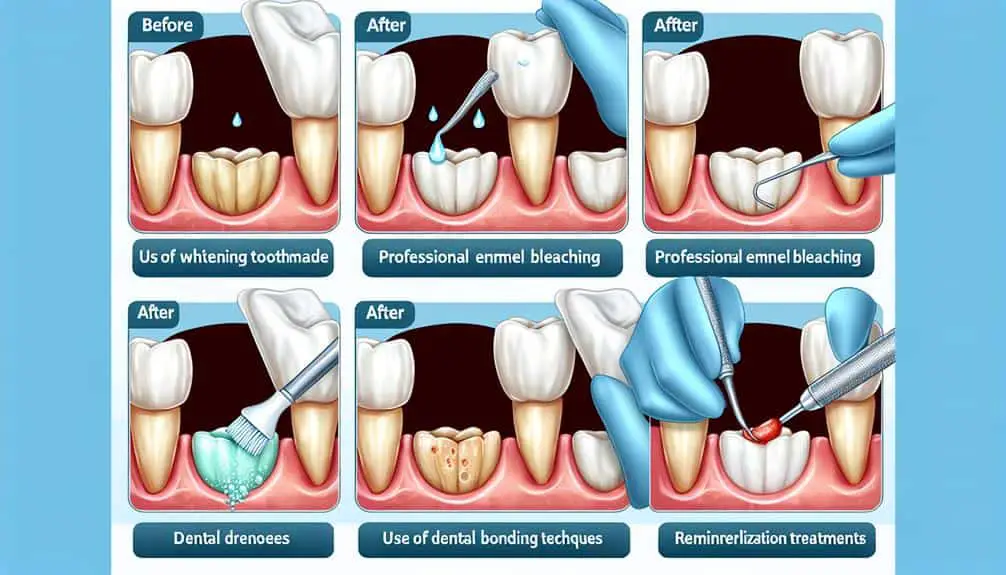If you're looking for the best enamel-safe teeth whitening treatments, consider the following options: In-Office Professional Whitening Treatments offer quick and effective results with guaranteed enamel protection. Custom Take-Home Whitening Kits provide convenience and personalized whitening. LED Teeth Whitening Systems utilize advanced technology for noticeable improvements. Whitening Pens and Gels allow for direct application and effective enamel-safe results. Charcoal Teeth Whitening Products offer natural benefits but require caution due to potential enamel harm. Whitening Toothpaste and Mouthwash are gentle alternatives for maintaining oral health while whitening.
Natural DIY Whitening Remedies offer cost-effective ways to brighten your smile naturally. Whitening Dental Treatments provide longer-lasting results tailored to individual needs. Enamel-Strengthening Whitening Solutions enhance overall tooth health and appearance. These treatments prioritize enamel safety and lasting brightness for a healthier, more radiant smile.
Key Points
- Use peroxide-free whitening strips for gentle and effective enamel-safe whitening.
- Opt for professional in-office whitening treatments for quick and lasting results.
- Consider custom take-home whitening kits for personalized enamel-safe whitening.
- Choose LED teeth whitening systems for efficient and noticeable enamel-safe results.
- Prioritize enamel-strengthening whitening solutions with fluoride or calcium phosphate.
In-Office Professional Whitening Treatments
When you visit a dental office for professional whitening treatments, a safe and effective process will be used to improve the brightness of your teeth. These treatments are designed to provide professional results while guaranteeing the protection of your enamel. The whitening agents used in these procedures are carefully applied to your teeth by trained professionals, minimizing the risk of enamel damage.
Professional whitening treatments typically involve the use of high-concentration bleaching agents that can deliver quicker and more noticeable results compared to over-the-counter products. The application of these agents is done under controlled conditions to maximize effectiveness and minimize potential side effects.
Moreover, in-office whitening treatments often incorporate additional measures to safeguard your enamel, such as the use of protective barriers on the gums and specialized lights to enhance the whitening process. These extra precautions help to ensure that you achieve a brighter smile without compromising the health of your teeth.
Custom Take-Home Whitening Kits
For a personalized approach to teeth whitening, consider utilizing custom take-home whitening kits that cater to your specific needs and preferences. These kits come with custom trays that are designed to fit your teeth perfectly, guaranteeing even application of the whitening gel for maximum effectiveness. The convenience of at-home treatments paired with the professional results achieved through these custom kits make them a popular choice among those looking to brighten their smiles.
Custom trays play an essential role in the success of at-home whitening kits. By molding to the contours of your teeth, they help to distribute the whitening gel evenly, minimizing the risk of uneven whitening or gum irritation. This personalized approach ensures that every tooth receives the treatment it needs, leading to more consistent and satisfactory results.
The effectiveness of custom take-home whitening kits lies in their ability to provide professional-grade results in the comfort of your own home. With proper and consistent use, these kits can help you achieve a brighter, whiter smile without the need for frequent visits to the dentist.
LED Teeth Whitening Systems
LED Teeth Whitening Systems use advanced LED technology to enhance the whitening process, offering benefits such as faster results and reduced sensitivity.
The LED light works by activating the whitening gel's ingredients, accelerating the breakdown of stains on the teeth for a brighter smile.
Understanding how LED technology functions can help you make informed decisions about incorporating it into your teeth whitening routine.
LED Technology Overview
Utilize the latest LED technology in teeth whitening systems to achieve brighter, whiter teeth efficiently and effectively.
LED technology advancements have revolutionized teeth whitening trends by providing faster and more reliable results.
LED lights are used in conjunction with whitening agents to accelerate the whitening process, breaking down stains and discoloration effectively.
These systems emit specific wavelengths of light that activate the whitening gel, enhancing its performance without causing harm to the enamel.
The LED technology used in modern teeth whitening systems is safe and widely preferred for its ability to produce noticeable improvements in a shorter amount of time compared to traditional methods.
Stay updated with the latest LED advancements in teeth whitening for a brighter, more confident smile.
Benefits of LED
Make the most of LED teeth whitening systems by harnessing their numerous benefits for achieving a brighter, more radiant smile efficiently and effectively. LED benefits include faster treatment times, reduced sensitivity compared to traditional methods, and better targeting of stains.
LED technology emits a specific wavelength of light that activates the whitening gel, accelerating the whitening process. Unlike UV lights used in some traditional methods, LED lights are safer for enamel and oral tissues. LED systems also tend to be more energy-efficient and longer-lasting, making them a cost-effective choice in the long run.
When comparing LED vs. traditional methods, LED stands out for its ability to deliver noticeable results in fewer sessions, with lower risks of adverse effects on teeth and gums.
How LED Works
To understand how LED teeth whitening systems work effectively, it's important to grasp the mechanism by which the specific wavelength of light interacts with the whitening gel to accelerate the whitening process. LED technology utilized in teeth whitening treatments emits a blue light that activates the whitening gel's active ingredients, typically hydrogen peroxide or carbamide peroxide.
This light therapy expedites the breakdown of stains on the tooth surface, allowing for a more rapid and efficient whitening process. The specific wavelength of the LED light is optimized to enhance the performance of the whitening gel without causing harm to the enamel.
Whitening Pens and Gels
Enhance the brightness of your smile with the convenience of whitening pens and gels, popular options for achieving a whiter teeth appearance. Whitening pens are easy to use, requiring a simple application directly onto the teeth. Their effectiveness lies in the formulation, which often includes hydrogen peroxide or carbamide peroxide that helps break down stains on the enamel surface. These pens are great for targeted application on specific teeth or areas that need a little extra brightening.
On the other hand, gel whitening products are also a common choice for teeth whitening. These gels typically come in syringes for easy application and contain similar active ingredients like hydrogen peroxide. When used correctly, gel whitening can effectively lighten the color of your teeth. Enamel safety is an important consideration when using these products. Look for gels that are enamel-safe to make certain that your teeth aren't damaged during the whitening process. Always follow the instructions provided to achieve the best results while maintaining the health of your teeth.
Charcoal Teeth Whitening Products
When contemplating charcoal teeth whitening products, it's important to grasp the potential benefits they offer for eliminating surface stains and brightening your smile.
However, it's essential to also be mindful of safety considerations, as charcoal products may be abrasive and could potentially harm tooth enamel if used improperly.
Before integrating charcoal whitening products into your oral care regimen, consult with your dentist to confirm they're suitable for your teeth and gums.
Charcoal Benefits
Charcoal teeth whitening products have gained popularity due to their purported benefits in removing stains and brightening teeth. When contemplating charcoal for teeth whitening, it's vital to grasp its potential benefits beyond aesthetics:
- Natural Whitening: Charcoal's abrasive texture can aid in eliminating surface stains effectively.
- Charcoal Detoxification: Some argue that charcoal can assist in detoxifying the mouth by binding to toxins.
- Fresh Breath: Charcoal may help combat bad breath by absorbing odor-causing bacteria.
- Oral Hygiene: Charcoal particles can help in cleaning hard-to-reach areas, promoting better oral hygiene practices.
While these benefits are promising, it's important to ponder safety aspects before integrating charcoal into your dental care routine.
Safety Considerations
Considering the potential benefits of charcoal teeth whitening products, it's important to address safety considerations when incorporating them into your dental care routine.
To guarantee enamel protection, follow essential safety precautions. Charcoal products can be abrasive, so be cautious when using them to avoid damaging your enamel. It's advisable to use charcoal teeth whitening products sparingly and not as a daily toothpaste replacement.
Excessive or aggressive brushing with charcoal can wear down enamel, leading to sensitivity and other dental issues. Always read and follow the manufacturer's instructions to minimize any potential risks.
If you experience any unusual sensitivity or changes in your oral health, discontinue use immediately and consult your dentist for guidance on maintaining enamel health.
Peroxide-Free Whitening Strips
To enhance your smile without the use of peroxide, consider trying whitening strips formulated without this bleaching agent. These peroxide-free options can still effectively whiten your teeth while being gentle on enamel. Here are some benefits of using peroxide-free whitening strips:
- Enamel Protection: Peroxide-free whitening strips are designed to be gentle on your enamel, reducing the risk of sensitivity or damage to the protective outer layer of your teeth.
- Natural Ingredients: Many peroxide-free whitening strips use natural ingredients like coconut oil or charcoal to help whiten teeth, providing a more natural approach to teeth whitening.
- Suitable for Sensitive Teeth: If you have sensitive teeth that react strongly to peroxide-based products, peroxide-free whitening strips can be a more comfortable alternative.
- Gradual Whitening: While peroxide-free strips may take a bit longer to show results compared to peroxide-based products, they offer a more gradual whitening process that can be easier on your teeth.
Consider trying peroxide-free whitening strips for a gentler yet effective way to brighten your smile.
Whitening Toothpaste and Mouthwash
When choosing a toothpaste for whitening, it's crucial to assess its effectiveness in comparison to regular toothpaste.
Moreover, investigating the advantages of whitening mouthwash can elevate your oral care routine.
To achieve optimal results, adhere to recommended tips for using these products effectively.
Toothpaste Effectiveness Comparison
How effectively do whitening toothpaste and mouthwash compare in improving the brightness of your teeth? When considering toothpaste and mouthwash for whitening, several key factors come into play. Here's a comparison to help you make an informed decision:
- Tooth Sensitivity: Whitening toothpaste may cause sensitivity in some individuals, while mouthwash is less likely to trigger this issue.
- Ingredient Comparison: Whitening toothpaste often contains abrasives and peroxide for stain removal, while mouthwash relies on whitening agents like hydrogen peroxide or carbamide peroxide.
- Duration of Contact: Toothpaste has longer contact with teeth during brushing, potentially enhancing whitening effects.
- Ease of Use: Mouthwash is easier to incorporate into your oral hygiene routine, offering convenience for some individuals.
Mouthwash Whitening Benefits
For achieving brighter teeth, consider the whitening benefits of mouthwash alongside whitening toothpaste. Mouthwash offers not only fresh breath but also additional oral health benefits.
When selecting a mouthwash for teeth whitening, choose one that contains hydrogen peroxide or carbamide peroxide, as these ingredients can help remove surface stains effectively. Additionally, some mouthwashes are formulated to provide enamel protection, ensuring that your teeth aren't only whiter but also shielded from potential damage.
Using a whitening mouthwash as part of your daily oral hygiene routine can complement the effects of whitening toothpaste, contributing to a brighter smile. Remember to follow the instructions on the mouthwash packaging for best results in your teeth whitening journey.
Usage Tips for Best Results
Consider incorporating whitening toothpaste and mouthwash into your daily oral care routine to maximize the effectiveness of these products for achieving a brighter smile. To guarantee you get the best results, follow these tips:
- Brushing Techniques: Use a soft-bristled toothbrush and gentle, circular motions to brush for at least two minutes, making sure you cover all tooth surfaces.
- Timing Recommendations: Brush with whitening toothpaste for two minutes twice a day, and use whitening mouthwash as directed, typically after brushing.
- Diet Considerations: Avoid foods and drinks that stain teeth, such as coffee, tea, and red wine, to maintain your whitening results.
- Maintenance Tips: Visit your dentist regularly for cleanings and check-ups to keep your smile bright and healthy.
Natural DIY Whitening Remedies
Wondering which natural ingredients can effectively whiten your teeth at home? Homemade remedies using natural ingredients can be a safe and cost-effective way to brighten your smile. One popular DIY whitening remedy is baking soda. Its mild abrasive properties can help remove surface stains on teeth. Mix a small amount of baking soda with water to form a paste, then gently brush it onto your teeth.
Another common natural ingredient for teeth whitening is activated charcoal. Although it may seem counterintuitive to brush your teeth with a black substance, activated charcoal is known for its ability to bind to toxins and stains, helping to remove them from the teeth.
Moreover, coconut oil pulling is a traditional remedy that involves swishing coconut oil around in your mouth to remove bacteria and promote oral health. While it may not directly whiten teeth, it can contribute to overall oral hygiene, which is essential for a bright smile. Remember, natural DIY whitening remedies may take time to show results, so consistency is key.
Whitening Dental Treatments
When seeking to enhance the whiteness of your teeth, professional whitening dental treatments offer effective solutions that can provide noticeable results. These treatments are carried out by dental professionals, guaranteeing a safe and controlled whitening process.
Here are some key points to take into account when looking into whitening dental treatments:
- In-Office Whitening: Professional whitening treatments done in-office involve the application of a whitening gel containing higher concentrations of bleaching agents than over-the-counter products.
- Customized Treatment Plans: Your dentist will customize the treatment to your specific needs, taking into consideration factors like the current shade of your teeth and your desired outcome.
- Reduced Sensitivity Formulas: Many dental offices offer whitening treatments with formulas designed to minimize tooth sensitivity during and after the procedure.
- Long-Lasting Results: Professional whitening treatments typically provide longer-lasting results compared to home remedies, making them a reliable option for achieving a brighter smile.
When exploring whitening dental treatments, discuss any sensitivity concerns with your dentist to make sure a comfortable experience.
Enamel-Strengthening Whitening Solutions
Enamel-strengthening whitening solutions offer a dual benefit by not only brightening teeth but also reinforcing the protective enamel layer. These solutions are designed to enhance the overall health of your teeth while improving their appearance. By incorporating ingredients that promote enamel protection, such as fluoride or calcium phosphate, these whitening products go beyond just cosmetic enhancements.
When considering enamel-strengthening whitening solutions, it's important to prioritize products that not only whiten teeth effectively but also contribute to the longevity of the whitening effects. Look for options that have been clinically proven to strengthen enamel and provide lasting results. By choosing these advanced formulations, you can achieve a brighter smile without compromising the health of your teeth.
Frequently Asked Questions
Are There Any Teeth Whitening Treatments That Are Safe for Pregnant Women?
During pregnancy, it's important to take precautions with teeth whitening treatments. Look for products with safe ingredients like hydrogen peroxide. Always consult your healthcare provider before using any whitening products to guarantee safety for you and your baby.
Can Teeth Whitening Treatments Cause Sensitivity or Damage to Dental Restorations Like Crowns or Veneers?
When whitening your teeth, it's important to take into account any dental restorations you have, like crowns or veneers. Some whitening treatments can cause sensitivity or damage to these restorations. Look for enamel-safe options to safeguard your dental work.
How Long Do the Effects of Teeth Whitening Treatments Typically Last?
Teeth whitening treatments typically last around 6 months to 2 years, depending on your habits and maintenance. Touch-up options like whitening toothpaste or occasional treatments can help prolong the effects. Guarantee enamel protection by following recommended guidelines.
Are There Any Age Restrictions for Using Teeth Whitening Products?
As a general rule, age restrictions for teeth whitening products are less about a specific number and more about individual oral health. Teenage users should consult a dentist, while senior citizens may face more enamel sensitivity.
Are There Any Potential Side Effects or Risks Associated With Using Enamel-Safe Teeth Whitening Treatments?
To guarantee enamel protection while maximizing whitening effectiveness, utilizing enamel-friendly treatments can help. Sensitivity prevention methods like desensitizing agents are advantageous. Adhere to recommended treatment duration for optimal results and minimal risks associated with teeth whitening.



